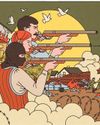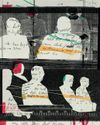
In September, 1870, while Prussian soldiers were trying to starve Paris into surrender, Claude Monet was in Normandy with his wife, Camille, and their son, Jean, looking for a boat out of France. They weren’t alone. Every day, hundreds of people went down to the docks in the hope of escaping the Franco-Prussian War; only later would Monet learn that some of his best friends had shoved through the same crowd. By November, he and his family had reached London, though they spoke no English. Months passed, and the Siege of Paris gave way to the Paris Commune and thousands of murdered civilians. The Monets moved on to the Netherlands, where Camille taught French and Claude painted canals. In photographs taken in Amsterdam around this time, their eyes look a decade older than the rest of them. They bought pots for a garden they might grow when the killing stopped.
Fleeing to two countries to avoid war was in some ways the rule, not the exception, of this artist’s life. He fled apartments to avoid creditors. He fled to the French coast to avoid the man whose wife he would marry. After getting married, he fled Paris for the calm of the countryside. He had some dozen addresses in five years, but it wasn’t the macho, Gauguin-in-Tahiti kind of fleeing that tends to turn into myth. If anything, Monet now stands for gardens and domestic coziness and knowing that the same things will be in the same places tomorrow—the kind of comfort, you could say, that matters most to someone for whom things often weren’t.
This story is from the September 23, 2024 edition of The New Yorker.
Start your 7-day Magzter GOLD free trial to access thousands of curated premium stories, and 9,000+ magazines and newspapers.
Already a subscriber ? Sign In
This story is from the September 23, 2024 edition of The New Yorker.
Start your 7-day Magzter GOLD free trial to access thousands of curated premium stories, and 9,000+ magazines and newspapers.
Already a subscriber? Sign In

GET IT TOGETHER
In the beginning was the mob, and the mob was bad. In Gibbon’s 1776 “Decline and Fall of the Roman Empire,” the Roman mob makes regular appearances, usually at the instigation of a demagogue, loudly demanding to be placated with free food and entertainment (“bread and circuses”), and, though they don’t get to rule, they sometimes get to choose who will.

GAINING CONTROL
The frenemies who fought to bring contraception to this country.

REBELS WITH A CAUSE
In the new FX/Hulu series “Say Nothing,” life as an armed revolutionary during the Troubles has—at least at first—an air of glamour.

AGAINST THE CURRENT
\"Give Me Carmelita Tropicana!,\" at Soho Rep, and \"Gatz,\" at the Public.

METAMORPHOSIS
The director Marielle Heller explores the feral side of child rearing.

THE BIG SPIN
A district attorney's office investigates how its prosecutors picked death-penalty juries.

THIS ELECTION JUST PROVES WHAT I ALREADY BELIEVED
I hate to say I told you so, but here we are. Kamala Harris’s loss will go down in history as a catastrophe that could have easily been avoided if more people had thought whatever I happen to think.

HOLD YOUR TONGUE
Can the world's most populous country protect its languages?

A LONG WAY HOME
Ordinarily, I hate staying at someone's house, but when Hugh and I visited his friend Mary in Maine we had no other choice.

YULE RULES
“Christmas Eve in Miller’s Point.”